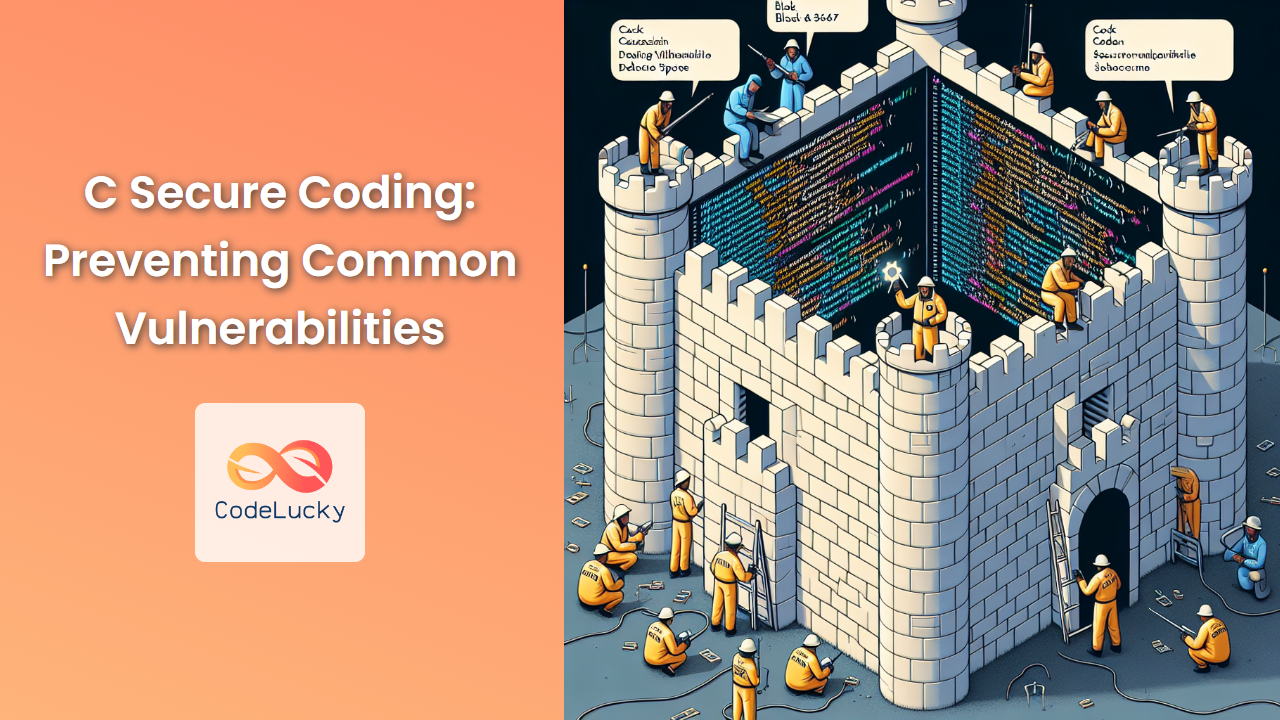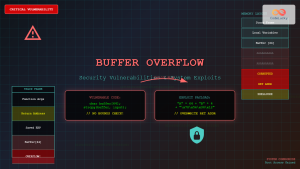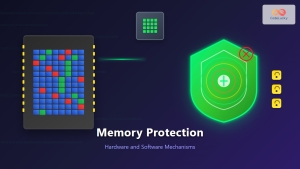In the world of software development, security is paramount. As C remains a popular language for system-level programming and performance-critical applications, understanding how to write secure C code is crucial. This article delves into common vulnerabilities in C programming and provides practical techniques to prevent them.
Buffer Overflows: The Silent Menace
Buffer overflows are one of the most notorious vulnerabilities in C programming. They occur when a program writes data beyond the bounds of allocated memory.
🚨 Fact: Buffer overflows have been responsible for numerous high-profile security breaches, including the infamous Morris Worm in 1988.
Let's look at a simple example of a buffer overflow:
#include <stdio.h>
#include <string.h>
void vulnerable_function(char *input) {
char buffer[10];
strcpy(buffer, input);
printf("Input: %s\n", buffer);
}
int main() {
char *user_input = "This is a very long input string";
vulnerable_function(user_input);
return 0;
}
In this code, vulnerable_function allocates a buffer of 10 characters but uses strcpy to copy a much longer string into it. This will cause a buffer overflow, potentially overwriting adjacent memory and leading to unpredictable behavior or security vulnerabilities.
To prevent this, we can use strncpy instead:
#include <stdio.h>
#include <string.h>
void secure_function(char *input) {
char buffer[10];
strncpy(buffer, input, sizeof(buffer) - 1);
buffer[sizeof(buffer) - 1] = '\0'; // Ensure null-termination
printf("Input: %s\n", buffer);
}
int main() {
char *user_input = "This is a very long input string";
secure_function(user_input);
return 0;
}
Here, strncpy copies at most sizeof(buffer) - 1 characters, and we explicitly null-terminate the string to ensure it's always valid.
Integer Overflow: The Sneaky Arithmetic Bug
Integer overflows occur when an arithmetic operation attempts to create a numeric value that is outside of the range that can be represented with a given number of bits.
🔢 Fact: Integer overflows can lead to unexpected program behavior, including security vulnerabilities when used in array indexing or memory allocation.
Consider this example:
#include <stdio.h>
#include <stdint.h>
void vulnerable_allocation(size_t n) {
int *array = malloc(n * sizeof(int));
if (array == NULL) {
printf("Allocation failed\n");
return;
}
// Use array...
free(array);
}
int main() {
size_t n = 1000000000; // A large number
vulnerable_allocation(n);
return 0;
}
If n is very large, n * sizeof(int) might overflow, resulting in a much smaller allocation than intended. To prevent this, we can use careful checking:
#include <stdio.h>
#include <stdint.h>
#include <stdlib.h>
void secure_allocation(size_t n) {
if (n > SIZE_MAX / sizeof(int)) {
printf("Allocation too large\n");
return;
}
int *array = malloc(n * sizeof(int));
if (array == NULL) {
printf("Allocation failed\n");
return;
}
// Use array...
free(array);
}
int main() {
size_t n = 1000000000; // A large number
secure_allocation(n);
return 0;
}
This code checks if the multiplication would overflow before performing the allocation.
Format String Vulnerabilities: The Deceptive Printf
Format string vulnerabilities occur when user input is passed directly as the format string to functions like printf.
📝 Fact: Format string vulnerabilities can allow attackers to read or write to arbitrary memory locations.
Here's an example of vulnerable code:
#include <stdio.h>
void vulnerable_print(char *user_input) {
printf(user_input);
}
int main() {
char *malicious_input = "%x %x %x %x";
vulnerable_print(malicious_input);
return 0;
}
In this code, if an attacker provides format specifiers like %x, they can potentially read values from the stack. To fix this, always use a format string:
#include <stdio.h>
void secure_print(char *user_input) {
printf("%s", user_input);
}
int main() {
char *malicious_input = "%x %x %x %x";
secure_print(malicious_input);
return 0;
}
Now, even if the user input contains format specifiers, they will be treated as literal characters.
Use-After-Free: The Dangling Pointer Problem
Use-after-free vulnerabilities occur when a program continues to use a pointer after it has been freed.
🔍 Fact: Use-after-free vulnerabilities can lead to crashes, data corruption, or even arbitrary code execution.
Here's an example of vulnerable code:
#include <stdio.h>
#include <stdlib.h>
struct User {
char name[50];
int id;
};
void vulnerable_function() {
struct User *user = malloc(sizeof(struct User));
// ... use user ...
free(user);
// ... more code ...
printf("User ID: %d\n", user->id); // Use after free!
}
int main() {
vulnerable_function();
return 0;
}
To prevent this, we can set the pointer to NULL after freeing:
#include <stdio.h>
#include <stdlib.h>
struct User {
char name[50];
int id;
};
void secure_function() {
struct User *user = malloc(sizeof(struct User));
if (user == NULL) {
printf("Allocation failed\n");
return;
}
// ... use user ...
free(user);
user = NULL; // Set to NULL after freeing
// ... more code ...
if (user != NULL) {
printf("User ID: %d\n", user->id);
}
}
int main() {
secure_function();
return 0;
}
Now, we check if the pointer is NULL before using it, preventing use-after-free vulnerabilities.
Command Injection: The Shell Shock
Command injection vulnerabilities occur when unsanitized user input is used to construct system commands.
🐚 Fact: Command injection can allow attackers to execute arbitrary commands on the host system.
Here's an example of vulnerable code:
#include <stdio.h>
#include <stdlib.h>
#include <string.h>
void vulnerable_system(char *username) {
char command[100];
snprintf(command, sizeof(command), "echo Hello, %s", username);
system(command);
}
int main() {
char *malicious_input = "user; rm -rf /";
vulnerable_system(malicious_input);
return 0;
}
This code allows an attacker to inject additional commands. To prevent this, we need to sanitize the input:
#include <stdio.h>
#include <stdlib.h>
#include <string.h>
#include <ctype.h>
void secure_system(const char *username) {
char sanitized[50];
size_t i;
for (i = 0; i < sizeof(sanitized) - 1 && username[i]; i++) {
if (isalnum((unsigned char)username[i])) {
sanitized[i] = username[i];
} else {
sanitized[i] = '_';
}
}
sanitized[i] = '\0';
char command[100];
snprintf(command, sizeof(command), "echo Hello, %s", sanitized);
system(command);
}
int main() {
char *malicious_input = "user; rm -rf /";
secure_system(malicious_input);
return 0;
}
This code sanitizes the input by replacing non-alphanumeric characters with underscores, preventing command injection.
Race Conditions: The Timing Attack
Race conditions occur when the behavior of a program depends on the relative timing of events, especially in multi-threaded programs.
⏱️ Fact: Race conditions can lead to data corruption, crashes, or security vulnerabilities in concurrent systems.
Here's an example of a race condition:
#include <stdio.h>
#include <pthread.h>
int shared_variable = 0;
void* increment_thread(void* arg) {
for (int i = 0; i < 1000000; i++) {
shared_variable++;
}
return NULL;
}
int main() {
pthread_t thread1, thread2;
pthread_create(&thread1, NULL, increment_thread, NULL);
pthread_create(&thread2, NULL, increment_thread, NULL);
pthread_join(thread1, NULL);
pthread_join(thread2, NULL);
printf("Final value: %d\n", shared_variable);
return 0;
}
This code has a race condition because multiple threads are incrementing shared_variable without synchronization. To fix this, we can use a mutex:
#include <stdio.h>
#include <pthread.h>
int shared_variable = 0;
pthread_mutex_t mutex = PTHREAD_MUTEX_INITIALIZER;
void* increment_thread(void* arg) {
for (int i = 0; i < 1000000; i++) {
pthread_mutex_lock(&mutex);
shared_variable++;
pthread_mutex_unlock(&mutex);
}
return NULL;
}
int main() {
pthread_t thread1, thread2;
pthread_create(&thread1, NULL, increment_thread, NULL);
pthread_create(&thread2, NULL, increment_thread, NULL);
pthread_join(thread1, NULL);
pthread_join(thread2, NULL);
printf("Final value: %d\n", shared_variable);
return 0;
}
Now, the mutex ensures that only one thread can increment shared_variable at a time, preventing the race condition.
Conclusion
Secure coding in C requires constant vigilance and a deep understanding of the language's quirks and potential pitfalls. By being aware of common vulnerabilities like buffer overflows, integer overflows, format string vulnerabilities, use-after-free, command injection, and race conditions, and by implementing the preventive measures we've discussed, you can significantly improve the security of your C programs.
Remember, security is not a one-time task but an ongoing process. Always keep your knowledge up-to-date, use static analysis tools, and perform regular code reviews to catch potential vulnerabilities early in the development process.
🛡️ Final Fact: The most secure code is often the simplest. Complexity can hide vulnerabilities, so strive for clarity and simplicity in your C programming.
By following these principles and practices, you'll be well on your way to writing more secure and robust C code. Happy coding, and stay secure!



















